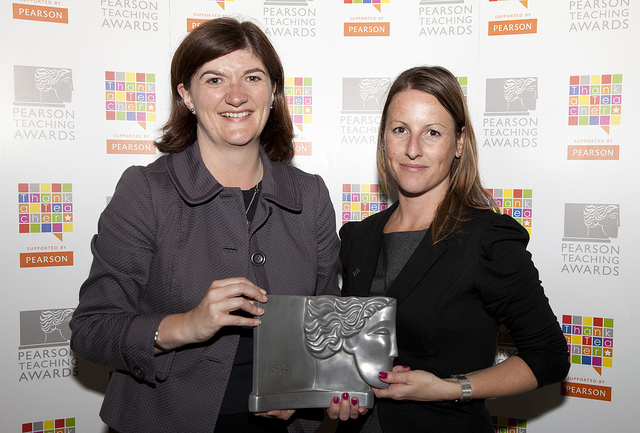All women shortlists are anti-meritocratic tokenism at its worst
All-women-shortlists are back on the agenda, with the Conservative Party’s Nicky Morgan suggesting that the party would be open to following Labour in their introduction. Here, Annunziata Rees-Mogg – a Conservative candidate at the 2010 General Election – argues against their use, describing them as tokenistic and anti-meritocratic, and puts the case for open primaries as a better method of choosing parliamentary candidates.
Once more the question of all women shortlists (or AWS if you like your acronyms) has raised its head. This time the “women’s minister” Nicky Morgan has thrown her weight behind considering them for the Conservative Party. The story was quickly shot down by a “senior source” saying no way: all women shortlists are not the answer to the problem.
So should we be open to the idea of all women shortlists? As a woman and a former Conservative parliamentary candidate, it would be natural to expect me to be in favour of this helpful step up. I am not. There is one overriding reason why AWS should be avoided like the plague: they are anti-meritocracy.
The best person should get the job of MP, or any other career, regardless of sex, creed, sexual orientation or any other random criteria. Just imagine if it were the other way round and we had men only lists. There would, rightly, be utter outrage. AWS is anti-meritocratic tokenism at its worst. Positive discrimination is not a Conservative value. It should not be adopted in the Party’s selection of future MPs.
Ms Morgan does, however, have a point. There are not enough women in the higher echelons of British politics. Why this is so is what needs to be tackled. I have been in three finals for selections. In all three there were two women and one man. In two of them a woman was selected.
This weekend a selection for a safe seat takes place that is all women in the final round. This is without positive discrimination. So why are there not equal numbers of men and women actually occupying the green benches in the House of Commons?
First of all politics is seen as sexist. Why would good women want to put themselves forward for an arena that a recent Mumsnet poll found nine out of ten women thought was sexist? The heckling, arrogant, chauvinistic reputation of UK politics is off putting to some women. Fewer women apply to be MPs than men – and fewer are successful. The problem is that too few women apply – not that too few get through the selection process.
Second, equality takes time. If the average MP stays for 20 years it takes four Parliaments for parity in selection to take effect on the floor of the House. Just as there has been a sea change in other career spheres there has been one in politics, but the changes take decades to filter through fully.
Third, politics and family life are hard to combine. The cult of youth has forced great women to choose between politics and children. This is true in most careers but emphatically so in politics.
If we encouraged older candidates, those with real life experience, to fight in their 40s or 50s women would not have to make such a hard choice. It is noticeable that the most senior woman at the moment does not have children.Theresa May has long focused on her political journey since becoming a local councillor at the age of 29. That is her choice but why should strong female candidates be forced to choose?
Commuting weekly, sitting in the House of Commons until 10pm, working at weekends – these are not things most mothers can contemplate with young children. Women should not need to have a committed partner in order to be political themselves.
We, the voters, deserve the best representative. We deserve to able to choose that representative freely. Open primaries are a start in democratising the party system. All women shortlists would do little but curtail voters’ choices.
—
Note: Please read our comments policy before posting. This post represents the views of the author and not Democratic Audit or the LSE. The shortened URL for this post is: https://buff.ly/VO6xAe
—
![]() Annunziata Rees-Mogg is a journalist and was the Conservative parliamentary candidate for Somerton & Frome at the 2010 General Election
Annunziata Rees-Mogg is a journalist and was the Conservative parliamentary candidate for Somerton & Frome at the 2010 General Election






 Democratic Audit's core funding is provided by the Joseph Rowntree Charitable Trust. Additional funding is provided by the London School of Economics.
Democratic Audit's core funding is provided by the Joseph Rowntree Charitable Trust. Additional funding is provided by the London School of Economics.
I do not find this argumentation to be coherent. All women shortlists are anti-meritocratic tokenism at its worst https://t.co/g8xGUJ7a6z
All women shortlists are anti-meritocratic tokenism at its worst https://t.co/YY1AN0Q5K9 DAMN INSULTING IF YOU ASK ME!
According to Annunziata Rees-Mogg, all women shortlists are anti-meritocratic tokenism at its worst https://t.co/UHpsGmVOIB
The case against all-women shortlists via @democraticaudit https://t.co/82lcctHp9c
All women shortlists are anti-meritocratic tokenism at its worst – at least according to a former Tory candidate https://t.co/6k3jUvARui
“@democraticaudit: tokenism at its worst https://t.co/jrGdYtZIQo”
Not clued up on AWS, but arguments against positive action here are awful.
All women shortlists are anti-meritocratic tokenism at its worst https://t.co/BjVSV1pYXx
Two very different takes on AWS on DA from our own @richard3berry (for) https://t.co/Kdu8rtZsim and @zatzi (against) https://t.co/63LTFnspRC
All women shortlists are anti-meritocratic tokenism at its worst https://t.co/dsmmYpa0qP
RT “@democraticaudit: All-women shortlists are anti-meritocratic tokenism at its worst https://t.co/gQ3tRZVtpl” [cc @curtrice]